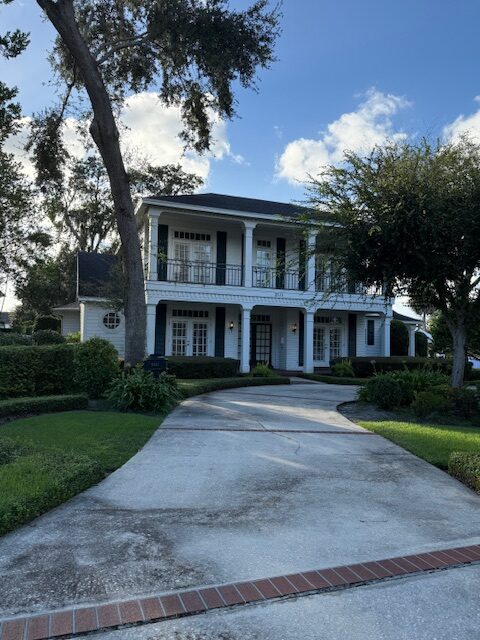
by Beth Kassab | Oct 9, 2025 | City Commission, News, Zoning and Development
P&Z Board Approves Racquet Club Expansion with Multiple Conditions
The plans must still win approval from the City Commission
Oct. 9, 2025
By Beth Kassab
The Winter Park Racquet Club made it over the first hurdle this week toward an expansion in the neighborhood known as “the Vias,” one of the city’s poshest enclaves between Lake Maitland and Temple Drive.
In a 5-1 vote, the Planning & Zoning Board approved plans with three new conditions to tear down the white-columned two-story home at 2111 Via Tuscany and allow the private club to build a larger one-story building to house a fitness center, locker rooms, tennis shop and offices.
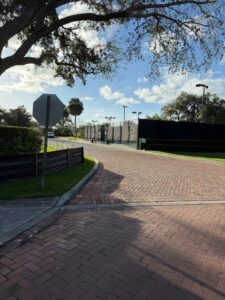
A view of the club’s pickle ball courts from Via Tuscany.
A crowd of neighbors — some who have planted red signs that say “Stop WPRC Commercial Expansion in our Neighborhood” in their front yards — attended to meeting to speak against the project with some comparing the tenor of the lights and activity at the club to a “Walmart” or “McDonald’s.”
Chairman Jason Johnson was the lone dissenting vote. Vashon Sarkisian, Charles Steinberg, David Bornstein, Alex Stringfellow and Michael Dick voted in favor. Bill Segal was absent.
Johnson said the changes appear as “commercial creep” in a residential area and said the term “sprawling campus” is “probably not an inaccurate description of what has happened with the club” that dates back to 1953.
“Is that to be expected?” Johnson asked. “Maybe, I guess? But this does sit in the middle of a residential neighborhood and at some point you’ve got to say I think it’s enough.”
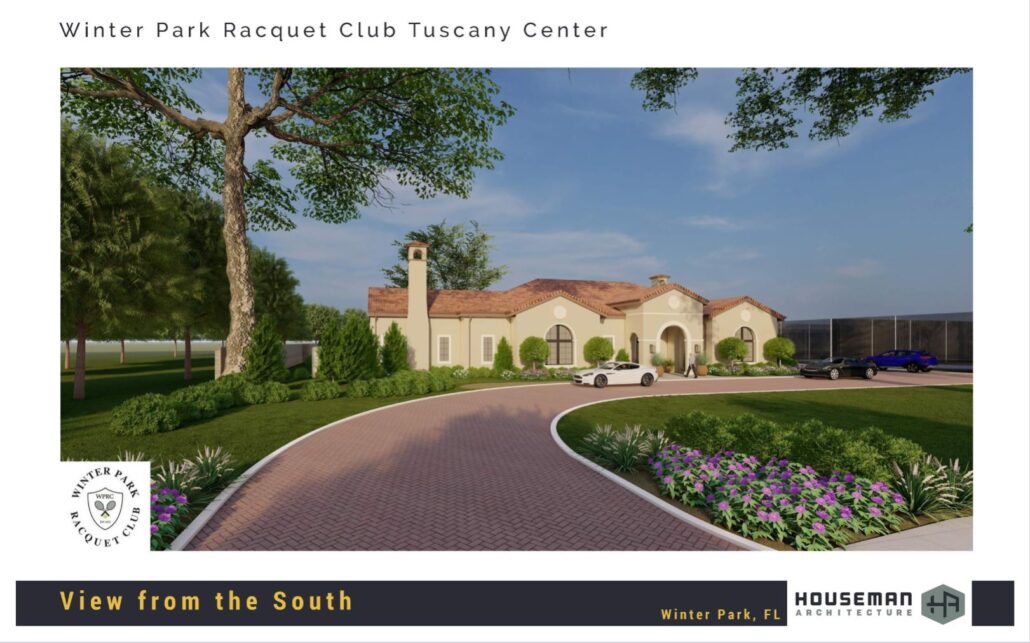
A rendering shows what the new Winter Park Racquet Club building will look like at 2011 Via Tuscany. The white home pictured above will be torn down.
The project and conditions must ultimately be approved by the City Commission.
Planning & Zoning members added the following conditions:
- The circular driveway in front of the new building will be limited to 12-feet wide at the entry and exit points and 14 feet in the interior. That’s a reduction from the 20-foot driveway proposed by the club after neighbors and board members expressed concern the space would essentially serve as a parking lot. The club’s original proposal called for striped parking in front of the new building, but it revised those plans after hearing concerns last month.
- The club must conduct a photometric study or an analysis of the lights emitted by the club, including pickleball and tennis courts, to make sure it’s compliant and does not interfere with nearby homes.
- Play on the pickleball courts, which sit closest to Via Tuscany, must end at 8 p.m. instead of the current 9 p.m. cutoff.
City staff also called for additional conditions such as the driveway access on Via Tuscany be an entrance-only; the club can not increase its membership; hours of operation for the new building will be 7 a.m. to 8 p.m. for the new building; no new lighting can be added in the grass parking lot and the new paved section must use “low-scale bollard fixtures rather than traditional pole-mounted lights;” all non-safety required lights be off by 10 p.m. daily and the removal of two oak trees result in double the typical compensation.
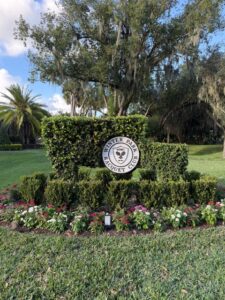 The club’s general manager did not immediately return a call for comment on the new conditions.
The club’s general manager did not immediately return a call for comment on the new conditions.
Rob Carter, the club’s volunteer president, said at the meeting that the club serves mostly Winter Park families, many who live in the neighborhood and walk or bike there. The home that will be torn down, he said, is outdated and will be replaced with a “safer one” that is compatible with the neighborhood and will not increase the intensity of the club’s operations.
“I do take some offense to the idea that we’re not trying to be a good neighbor,” he told the board, emphasizing that he incorporated residents’ feedback into the latest proposal and has offered to meet with people who live nearby and have concerns.
Demolition on Isle of Sicily
The P&Z board also approved plans by owners Kamran and Mina Khosravani for a new 10,400-square-foot home at 3 Isle of Sicily, meaning the current house originally built by famed local architect James Gamble Rogers II will be torn down.
The original home known as Four Winds dates to 1930 and sat at just 1,800-square-foot in the French provincial style. But the home had been altered significantly over the years and Jack Rogers, an architect and son of Gamble Rogers, said the damage to its integrity and history had been done long ago.
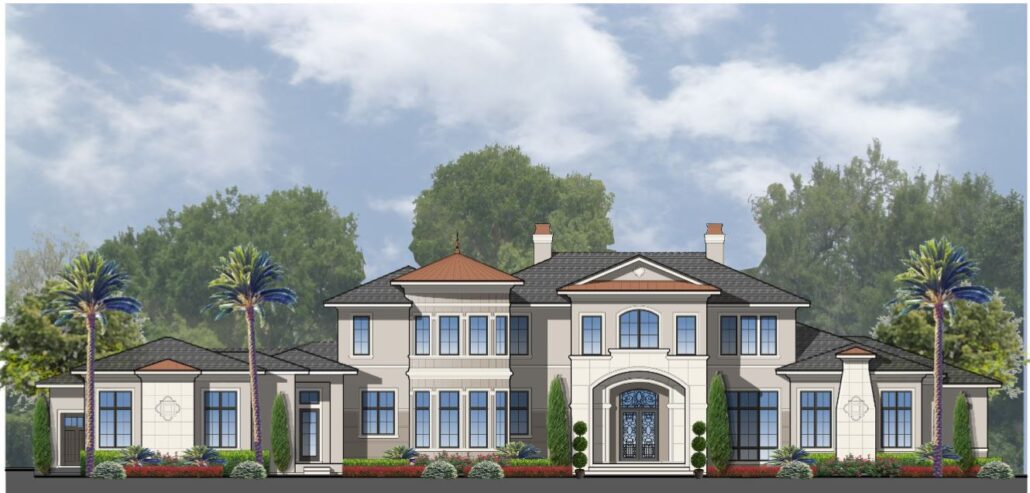
A rendering shows the proposed new home at 3 Isle of Sicily.
The project was approved unanimously by the board with little discussion and no public comment.
Over the years the number of Gambles Rogers homes in Winter Park has dwindled from about 50 to 15 or 20, Rogers said.
WinterParkVoiceEditor@gmail.com
To comment or read comments from others, click here →
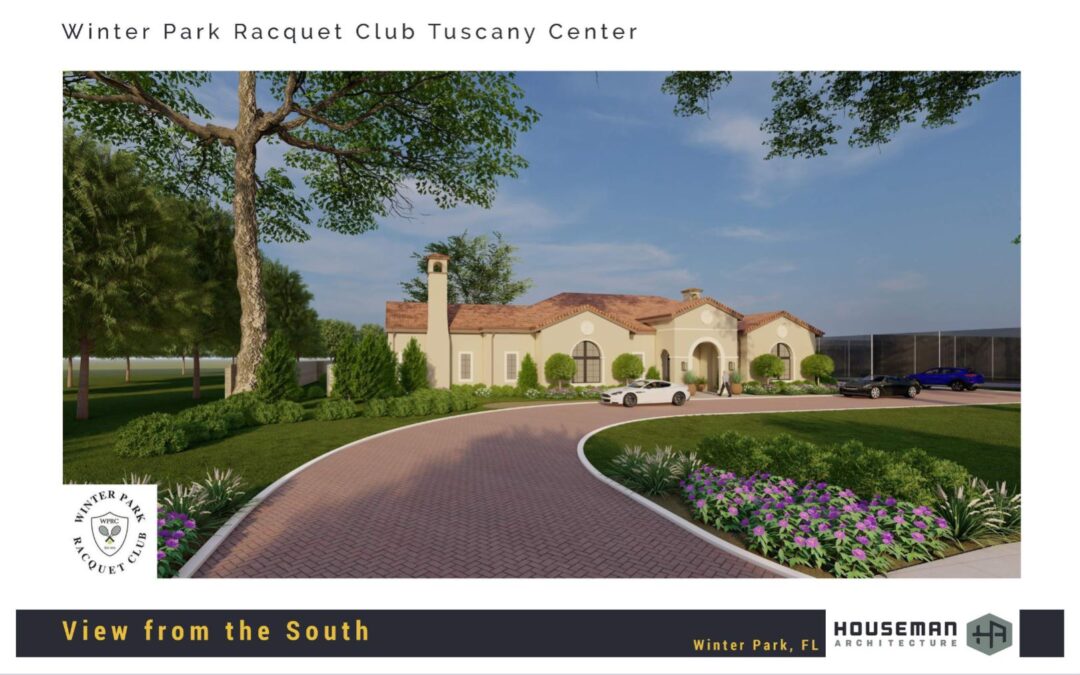
by Beth Kassab | Oct 7, 2025 | City Commission, Historic Preservation, News, Zoning and Development
Upcoming Demolitions: At Racquet Club, a Gamble Rogers House and Park Ave Apartments
Two city advisory boards will consider the three projects this week
Oct. 7, 2025
By Beth Kassab
One of Winter Park’s most exclusive hang-outs wants permission to demolish a 5,400-square-foot two-story building at the front of its property and build a larger one-story structure to house a fitness center, locker rooms, tennis shop and offices.
The Planning & Zoning Board will consider the proposal Tuesday evening by the Winter Park Racquet Club, a private club that dates back to the early 1950s on Lake Maitland that offers swimming, dining, pickleball and tennis with initiation fees that run upwards of $22,500, according to one document that advertised a job posting there.
The changes at 2111 Via Tuscany have drawn criticism from neighbors on the residential street who say they are worried about commercial-like development, traffic and noise. As a result, the proposal has gone through revisions since the concept was tabled at the Sept. 2 Planning & Zoning Board meeting.
“The style will add cohesion to the rest of the club buildings, including the original clubhouse which was designed by [local architect James] Gamble Rogers,” read a description submitted by the club. “It will also mimic the aesthetics of neighboring homes, and the intent is for people driving by to assume that it is a residence that has been here all along.”
Residents expressed concerns about the disruptions to be caused by construction, light pollution, parking and other issues, according the minutes of a neighborhood meeting.
“I am extremely concerned that this project continues to seek to convert this house into a commercial multi-use facility,” Marci Greenberg, who lives across the street, wrote to the city, one of a number of emails received about the project. “With the new plans, there will still be a significant increase in traffic, parking in front of the building (as the new circular drive is 20 ft wide which is as wide as Via Tuscany) and an increase in noise. The current house, as such, contributes to the character and ambiance of the neighborhood. The proposed building looks commercial and detracts from our residential neighborhood.”
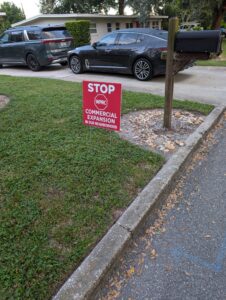
A sign in the neighborhood near the Racquet Club opposes changes there.
The club manager did not return a call for comment, but documents say the club is on a “membership waitlist” and is not accepting new members, meaning the project is not intended to allow any growth or expansion of services.
In response to concerns, the club has removed from the plans new parking that was to be added in front of the building and replaced it with a circular driveway.
City staff is also requesting other conditions such as the hours of operation remain the same, no new lighting be added and most exterior lights (other than for safety purposes) be turned off by 10 p.m.
Noise issues are also being addressed, according to the staff report.
“[The club] is proposing a six-foot acoustic sound barrier behind the eight-foot podocarpus hedge in front along Via Tuscany to screen the parking and buffer the noise concerns raised by the neighborhood,” it said. “This sound barrier will be the same barrier used to buffer the pickleball courts that is designed to reduce noise levels in outdoor settings and is made of a dense, soundproofing composite, and unlike a solid and rigid concrete wall, it both blocks and absorbs sounds more effectively.”
Another Gamble Rogers House Likely Gone
Not far from the Racquet Club is a secluded peninsula that stretches into Lake Maitland from its eastern shore called the Isle of Sicily — one of the city’s richest streets. James Gamble Rogers II, who also designed the racquet club, constructed the first home on the isle about 1930, an 1,800-square-foot French provincial home known as Four Winds that the famed architect lived in with his family until 1949.
Now the house at 3 Isle of Sicily is likely to be torn down as part of a plan to builder a larger home on the property.
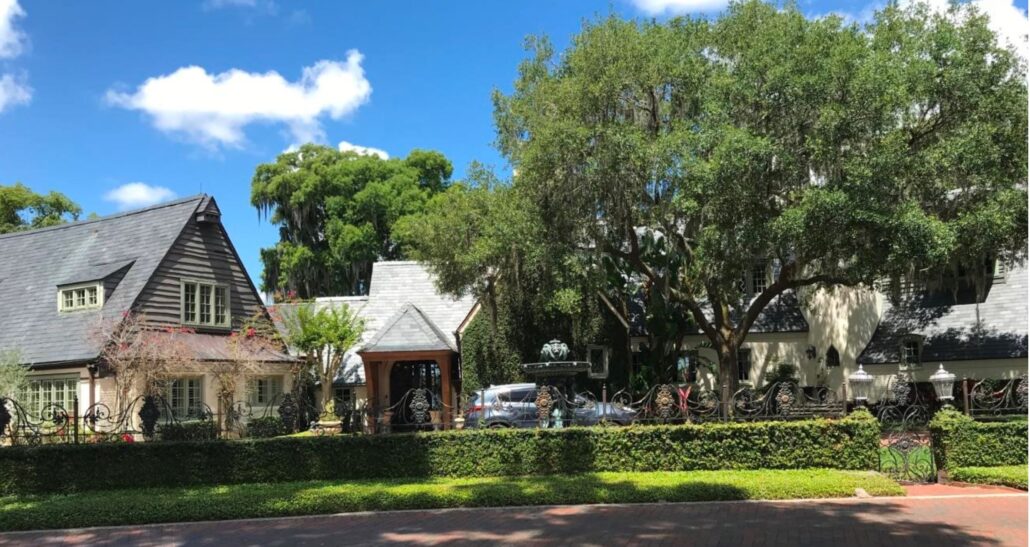
A view of the home at 3 Isle of Sicily today as recorded by the Orange County Property Appraiser.
Over the years, the house was renovated extensively and now sits at more than 7,000-square feet.
Owners Kamran and Mina Khosravani, who acquired the property in 2011, are looking to build a new home that will top 10,400 square feet.
The home is not on the city’s historic register so the owners don’t need permission to demolish it, but will ask the P&Z Board today for approval of the new lakefront construction.

A rendering shows proposed new construction at 3 Isle of Sicily.
Jack Rogers, architect and son of Gamble Rogers, said he’s sorry to see the house come down, but it hasn’t looked like the original in decades.
“Unfortunately, the damage was done 50 or more years ago,” Rogers said. “The original house is completely gone.”
His father, who is also known for the Florida State Supreme Court Building in Tallahassee and the Olin Library on the Rollins College Campus, built about 50 houses in Winter Park, he said. His papers and plans are preserved at the Winter Park Library.
“There’s probably 15 or 20 left and eight or 10 are absolutely precious and we seem to be losing them at the rate of one or two a year,” Rogers said. “We still have several wonderful examples.”
Park Ave Apartments Face Demo for Townhomes and Synagogue
The apartment buildings dating back to 1922 known as El Cortez could be demolished to make way for new townhomes and a new synagogue if the Historic Preservation Board approves a proposal up for consideration on Wednesday.
The board tabled the request at its Sept. 10 meeting in order to see if the developer could save one of the three buildings at 210 E. Morse Blvd. that are part of the Interlachen Avenue Historic District. The property is also the last R-4 zoned land just off Park Avenue that has yet to be redeveloped.
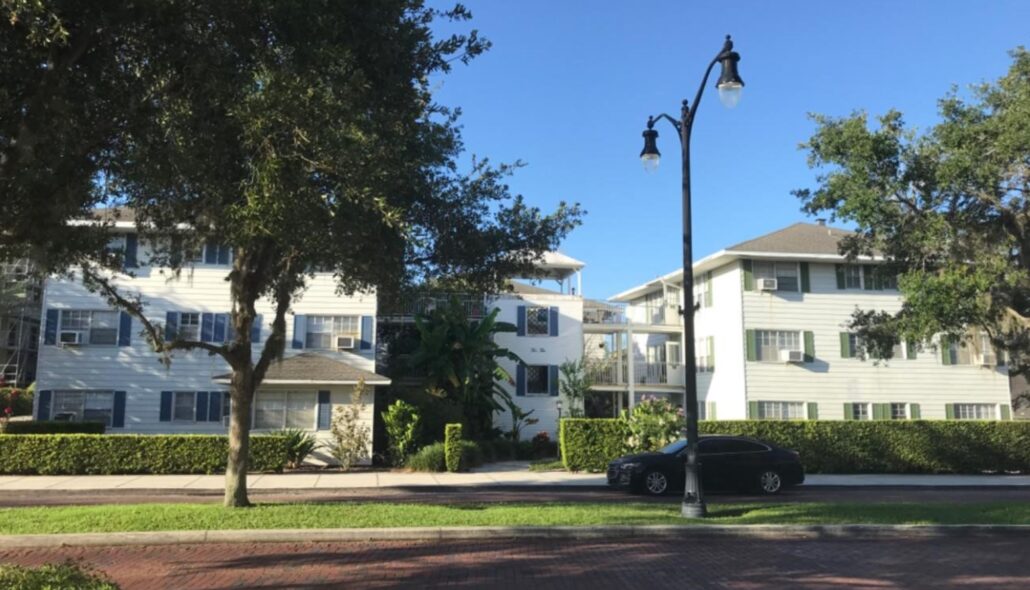
The El Cortez Apartments along Morse Boulevard.
The city discourages demolition of so-called “contributing structures” to historic districts such as El Cortez, but does approve knock-downs when preservation isn’t feasible.
The property owner and applicant for the project, a company called El Cortez LTD and managed by AGPM founder Scott Zimmerman, said the buildings represent a “frame vernacular style,” but have been significantly altered over time with no original exterior materials or features remaining.
The new development would create townhomes on Morse and a synagogue along Knowles Avenue. Staff received 32 letters in support of the project and one against, according to documents related to the meeting.
In the 1920s the building were constructed as upscale apartments amid growing demand for more housing in downtown Winter Park and near Rollins College. Over the years, a number of notable people lived there, according to National Register of Historic Places documents, such as “physician Benjamin Hart; Christopher Honaas, director of the Rollins College Conservatory of Music; Flora Magoun, secretary to the Conservatory; Margaret Windau, district director of the Florida Welfare Board; Helen Drinker, proprietress of a women’s fashion shop on Park Avenue North; and William Stein, a Romance Languages professor at Rollins College of Jewish descent who had recently immigrated from Austria to avoid Nazi persecution.”
Rogers said his dad told him he also stayed at El Cortez while Windsong, the Isle of Sicily property also likely set for demolition, was being constructed.
City staff is recommending approval of the project with the following conditions: A historic marker be placed there to commemorate the historical significance of the property and that the demolition not occur until the owner has a building permit from the city to ensure development plans don’t change between the time of the tear-down and new construction.
New Historic Survey Considered
The Historic Preservation Board will also on Wednesday consider a contract with Orlando-based KMF Architects for $75,000 to survey the city’s historic assets.
The proposal calls for updating the 2001 and 2013 surveys and will include an evaluation of Mid-Century Modern architecture (1950s-1970s), a era that hasn’t previously been surveyed citywide.
The work on Mid-Century Modern work will include a focus on Orwin Manor “to support the city’s consideration of a potential historic district designation.”
Four historic districts already exist in Winter Park — Downtown, College Quarter, Virginia Heights East and Interlachen Avenue — and those will be evaluated to determine if any non-contributing buildings now meet criteria for contributing status.
The survey will update records and remove properties on previous surveys that have since been demolished to produce a detailed report with photos that is both “informative and user-friendly,” according to the architects’ proposal.
WinterParkVoiceEditor@gmail.com
To comment or read comments from others, click here →
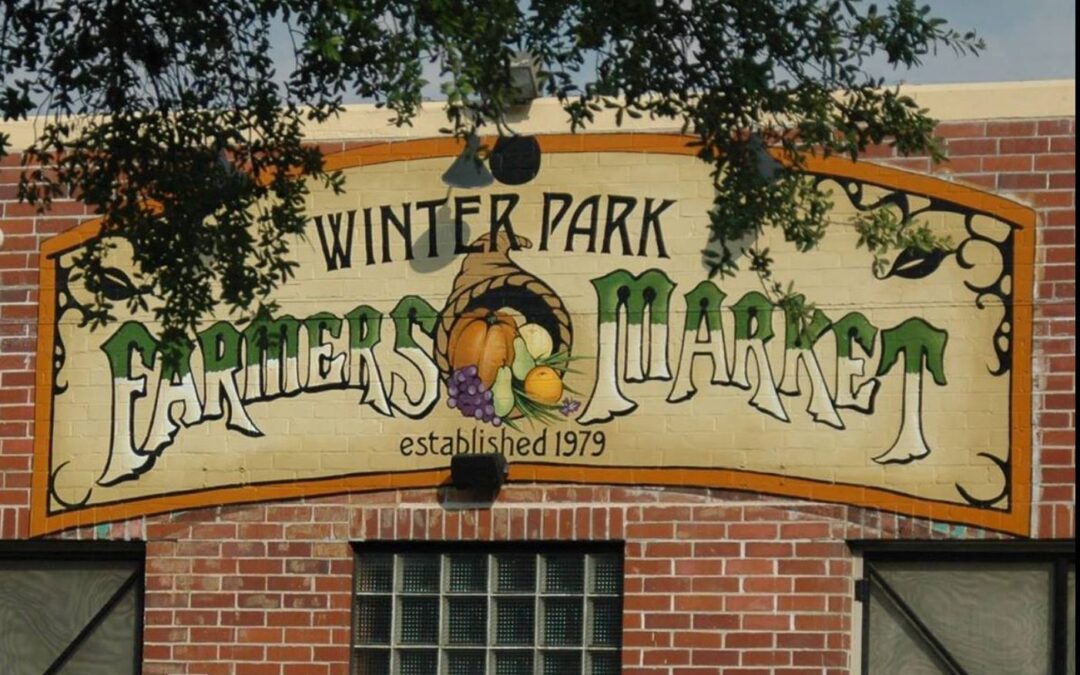
by Beth Kassab | Sep 25, 2025 | City Commission, News
City Budget Passes with Last-Minute Changes
A makeover for a Howell Branch retention pond and adjustments to the cost of Farmer’s Market tables and cemetery plots were added just before the vote
Sept. 24, 2025
By Beth Kassab
City Commissioners passed a $233 million budget that will take effect next month with a few minor changes to parks and recreation fees and a set aside of $250,000 from the contingency fund to redo an eyesore retention pond project near Howell Branch Preserve.
The budget, which holds the line on property taxes, includes higher electric rates and fee increases for a variety of city services from after-school programs to golf rounds. Commissioners opted to cut the proposed fee increases on two items: The cost paid by vendors at the Farmer’s Market and plots at the Pineywood and Palm cemeteries.
The current vendor cost for the Winter Park Farmer’s Market is $120 to $150 per month. The Parks & Recreation Advisory Board recommended raising it to $145 to $180 per month to bring fees more in line with two other popular regional markets in Winter Garden and at Lake Eola, which charge up to $200 a month.
But commissioners decided to go with a recommendation from city staff for a slightly lower increase to $130 to $160 a month.
Commissioners also decided to stick with a staff recommendation for smaller increases at Pineywood and Palm cemeteries.
Plots at Pineywood will go from $2,900 to $3,090 while plots at Palm will go from $5,800 to $6,090.
There are 549 spaces available at Palm and 621 spaces available at Pineywood.
A new columbarium is being added at Palm to replace the existing maintenance facility on the fourth hole of the Winter Park Nine, which will add several hundred new niches for cremated remains. A new columbarium, which opened in 2024 at Pineywood, still has 580 spaces available. The niches at both cemeteries are rising in cost from $2,625 for residents to $2,760.
Annual revenue from the cemeteries topped $700,000 in 2025 and is about $650,000 so far this year.
Commissioner Warren Lindsey also moved to mark $250,000 from the city’s contingency fund for a makeover of a retention pond at Howell Branch Road and Via Tuscany.
The project is contingent on a private $400,000 donation.
Steve Goldman, chairman of the Winter Park Land Trust, said the group is willing to make the donation as a first step toward beautifying the property and, eventually, connecting it to nearby Howell Branch Preserve Park. (Full disclosure: Goldman is a key funder of the Voice. Editorial decisions are made independently and not on the basis of donor support.)
He said the idea is to move the pond farther away from the road and reshape it so that it no longer requires a chain link fence for safety reasons. The design would call for more greenspace and also the replacement of a large concrete weir that the group considers an eyesore.
“We would like to see sufficient space between the pond and the road and also move the sidewalk farther from the road so it’s not so dangerous,” said Goldman, who lives nearby. “It’s getting rid of an eyesore basically and making it a more beautiful pond and park.”
Commissioner Warren Lindsey moved to add the project back to the budget after the commission was left with more contingency funds as a result of a 7% increase in the non-fuel portion of electric bills.
“It is a very civic and wonderful thing they have agreed to do as conservationists and helping with the park and stormwater issues at the same time,” Lindsey said of the private donation from the land trust.
Commissioner Marty Sullivan, who is set to leave office next year, had long championed finding a solution for the property and said he was pleased the donation combined with city funds could finally kick-off the project.
WinterParkVoiceEditor@gmail.com
To comment or read comments from others, click here →
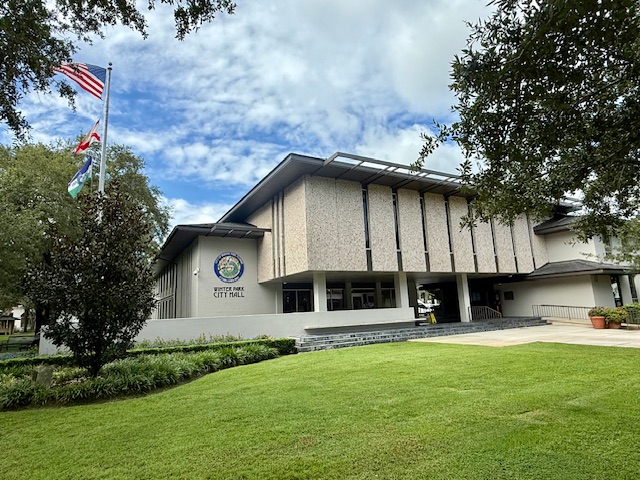
by Beth Kassab | Sep 24, 2025 | City Commission, News, Taxes, Uncategorized
How Today's City Commission Meeting Will Hit Your Wallet
Winter Park is poised to raise fees for everything from a round of golf to after-school programs along with a portion of your power bill
Sept. 24, 2025
By Beth Kassab
Winter Park Commissioners are set to vote Wednesday afternoon on the city’s $230 million budget, which includes an electric rate increase — though lower bills for the time being — and higher prices for everything from cemetary plots, off-duty police, rounds of golf and after-school programs.
The new fee schedule, which is slated to be adopted today along with a second and final vote on the 2026 budget, will take effect Oct. 1.
Some examples:
- Fire department detail for special events (with at least 10 days notice): From $47 per hour (for a minimum of three hours) to $60 an hour.
- Off-duty police officer (with at least seven days advance notice): From $57 per hour to $58 (with a four hour minimum); holiday pay for off-duty officers will move from $82 to $83 per hour.
- Fees for adult sports teams fees will jump from $500 for flag football and softball to $550.
- Youth after-school programs will increase from $50 to $55 monthly for residents and from $90 to $100 for non-residents.
- A single resident space at Palm Cemetery will jump from $5,800 to $6,950.
- Greens fees at the Winter Park Nine for residents on Friday through Sunday will increase from $22 to $26. Electric cart rental will go from $12 to $14 and from $10 to $12 for seniors.
- Rental of the Winter Park Events Center on a Saturday will change from $5,50 to $5,775.
The city’s budget proposal discussed how slower growth forecast in the economy means “adding new services and projects will only be possible in the context of the growth rate of traditional revenue sources such as the millage rate, fees and customer rates.”
The document even went so far as to make clear that fees for services have already become a critical piece of the budget as City Commissions have decided against raising the millage rate (which determines how much residents and businesses pay in property taxes, which make up the largest portion of the city’s general fund). And how future increases are likely:
“As the second largest component of the general fund at 20%, and as one of the few revenue sources that the city has direct control over, charges for services is likely to increase over time as fees and prices for activities and services will have to continue to be raised to support operations. In many municipal circles this is being called the pay-to-play form of providing services to residents and businesses and will only be more crucial if property tax revenue growth rates begin to slow.”
A portion of resident’s electric rates will also climb in October, though total bills will decrease.
That’s because the electric bill includes multiple fees, charges and taxes with some going up and one going down.
The non-fuel portion of electric rates based on how much each customer uses will increase by about 7%. That equates to a monthly jump from $91.46 to $98.26 for a home using 1,300 kwh, according to an estimate provided by the city.
But the charges customers pay for fuel (mostly natural gas in Winter Park) are going down from $49.20 to $29.61, resulting in a lower monthly bill.
Fuel charges, however, are variable and could rise again.
WinterParkVoiceEditor@gmail.com
To comment or read comments from others, click here →
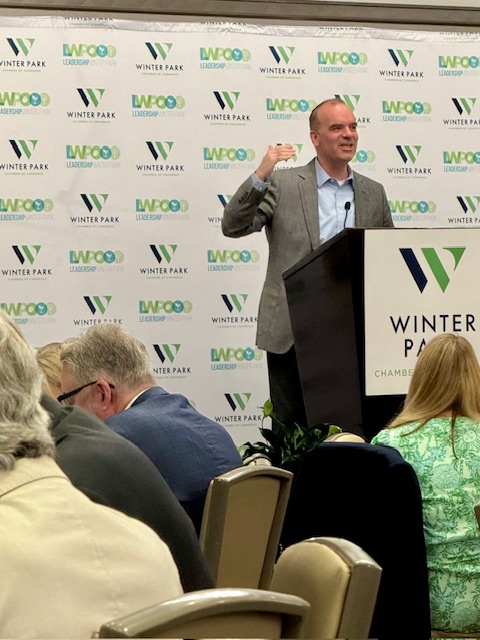
by Beth Kassab | Sep 19, 2025 | City Commission, Election, News, Uncategorized, Zoning and Development
Rethink Zoning Laws? Author Argues Rules Impair Upward Mobility
The Winter Park Chamber offered a zoning history lesson at its annual Outlook luncheon and set the stage for a contested city commission race with Michael Carolan likely to run against Elizabeth Ingram
Sept. 19, 2025
By Beth Kassab
Winter Park Chamber of Commerce President and CEO Betsy Gardner called on city leaders and residents to rethink zoning laws that she says have protected anti-development interests and blunted the opportunities for new housing in Winter Park.
Gardner said the city’s desire to remake Fairbanks Avenue near Interstate 4, now part of the Community Redevelopment Agency, is Winter Park’s next chance to prevent more strip centers and encourage the kind of growth that will attract families and new residents.
“This conversation about land use is also a conversation about who gets to belong,” she said, though she added, “We do not support the replication of the density we see in Maitland.”
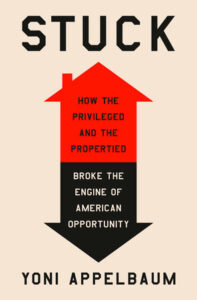
Yoni Appelbaum, pictured above, spoke at a lunch hosted by the Winter Park Chamber of Commerce on Friday.
Gardner’s remarks came at the chamber’s annual Outlook lunch, which explores topics related to economic development. This year’s keynote speaker was Yoni Appelbaum, who wrote, “Stuck: How the Privileged and the Propertied Broke the Engine of American Opportunity.”
Appelbaum, also deputy executive editor of The Atlantic and a historian, discussed how Americans “invented a profound human freedom” known as upward mobility. For more than a century, people were free to move beyond the station in life they were born into and toward prosperous city centers with jobs, social currency and a solid supply of housing stock.
That meant families moved many times, each time upgrading the kind of home they lived in.
But that’s not the case today, he said, as housing is often unaffordable and hard to come by in the places considered most desirable because of proximity to jobs and lifestyle amenities. (Case in point: Winter Park, where the median housing price is $700,000 or more, according to some sources.)
“Americans have stopped moving to the most prosperous places. People now move away from those places and to where the housing is cheap,” Appelbaum said. “Many have the sense that something has gone wrong in their lives .. that some element of the American promise has been broken.”
That’s the kind of loss of community and disenfranchisement credited with sweeping President Donald Trump into office and remaking the focus of the Republican Party.
Appelbaum stayed away from politics in his talk, but said the root of that shift dates back to the beginnings of zoning laws that came about as a way for those already settled in a place — mostly rich and white homeowners — to keep out others who were new and different.
He pointed to early laws in Modesto, CA that segregated Chinese laundry workers into what ultimately became known as “Chinatown” because white homeowners did not like that the workers were also living in their places of business. In 1885, Modesto outlawed laundry facilities “except within that part of the city which lies west of the railroad track and south of G Street,” the book reads.
And zoning laws, often dictating where certain types of businesses could operate, were born.
Later came height caps on buildings in New York City to drive up prices and push sweatshops farther to the outskirts. And historic preservation laws in Charleston, S.C. that he says served to stunt the city economically in the name of preserving a past that depended on enslaved people.
“What I find useful about the past is the ability to imagine different presents and different futures,” he said. “I am not here to tell you to abandon historic preservation or abandon zoning. What I do want for us to all think about is what we’re all after.”
In one passage of his book he discusses how he can see three large apartment buildings going up out his own window that will combine to a couple thousand new units, including more than a fifth described as “affordable.”
“Like all new developments, it leaves a good deal to be desired,” he wrote. “The architecture strikes me as blandly corporate. Local regulations, historic preservation and participatory planning have combined to limit the development on the site to just a fraction of what it might have held … Although I have little affection for cookie-cutter six-story apartment buildings, I don’t want to repeat Veiller’s error of mistaking my own aesthetic judgments for the public good.”
Those apartments, he noted, will mean upward mobility for some families.
Gardner said what happens in the Fairbanks corridor is up to residents and called on attendees — which included Mayor Sheila DeCiccio and commissioners Craig Russell, Marty Sullivan and Warren Lindsey along with city administrators — to use their power in the voting booth in March when two city commission seats are on the ballot.
At a recent workshop commissioners discussed potential rule changes, including lowering transportation impact fees, to encourage development. There appeared to be support for “quality, mixed-use development with a multi-family, workforce housing component, and to develop a comprehensive approach with the Planning and Zoning Board and Economic Development Advisory Board,” according to minutes of the meeting.
In a brief interview after the program, Gardner told the Voice that many people “lost trust” in the public process after the original development guidelines for the Orange Avenue Overlay were overturned, in part by DeCiccio and Sullivan.
Asked who she would support in the March election, she introduced attorney Michael Carolan, chairman of the real estate department at Winderweedle, Haines, Ward and Woodman, as a candidate for Seat 1 on the commission to replace Sullivan, who is retiring after two terms.
Carolan, who was chairman of the chamber board in 2020 and has also served on the board of the Coalition for the Homeless in Central Florida, said he plans to run but has not yet made it official by turning in paperwork to the city clerk.
Elizabeth Ingram is also seeking Sullivan’s seat and officially launched her campaign this week with an email to residents that said she is committed to “protect the qualities that make Winter Park special — its historic charm and small-town character, parks and recreation, and strong sense of community — while planning responsibly for the future.”
The trained opera singer currently serves on the Public Art Advisory Board and led the Dommerich Elementary Parent Teacher Association and is the only person who has officially opened a campaign account so far.
Russell, who serves in Seat 2, has said he plans to seek re-election.
The official qualifying period for the election runs from Dec. 1 to Dec. 8.
WinterParkVoiceEditor@gmail.com
To comment or read comments from others, click here →
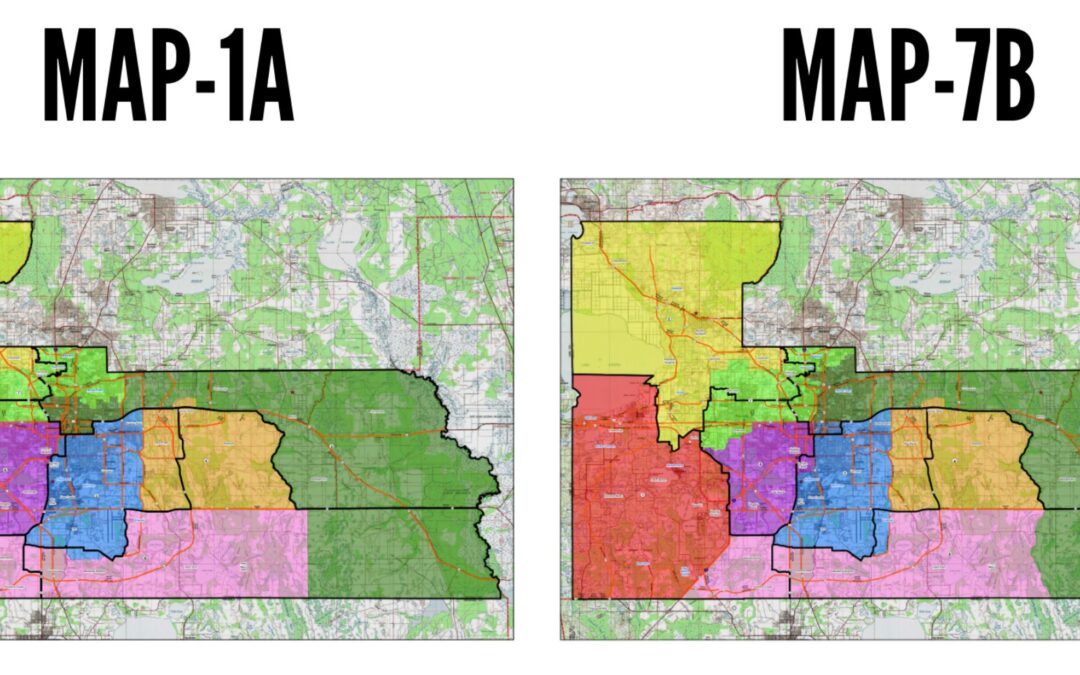
by Beth Kassab | Sep 17, 2025 | City Commission, Election, News, Uncategorized
Kelly Semrad Says She is Undecided on Redistricting Maps
Winter Park is making a hard push to move out of Semrad’s district as Orange County redraws the boundaries for how the County Commission is elected
Sept. 16, 2025
By Gabrielle Russon
Where Winter Park will land on a new map of Orange County Commission districts is still unclear as county leaders are divided on which map to pick with Kelly Martinez Semrad, who represents the city on the board, saying she is now undecided.
The commission met Tuesday in a workshop but isn’t scheduled to take a final vote until Oct. 14 on the new boundaries that are being redrawn to grow the board from six to eight commissioners elected by district. The mayor also has a vote on the board and is elected by the entire county.
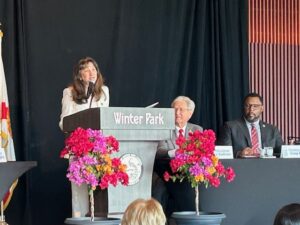
Mayor Sheila DeCiccio speaks at the 2025 State of the City event.
Winter Park city officials continue to lobby in force for the county to put the city in the newly drawn District 7 along with its neighbors Maitland, Eatonville and Pine Hills, an unincorporated neighborhood in Orange County. That option is Map-1A.
The other option, Map-7B, would keep Winter Park in the current District 5 along with rural eastern Orange County represented now by Semrad.
A redistricting advisory committee that spent months getting public feedback and looking at different options presented Map-1A and Map-7B as the final two proposals to the county board Tuesday. But the advisory committee wouldn’t go as far as picking which one it liked best, leaving that decision up to the county commissioners.
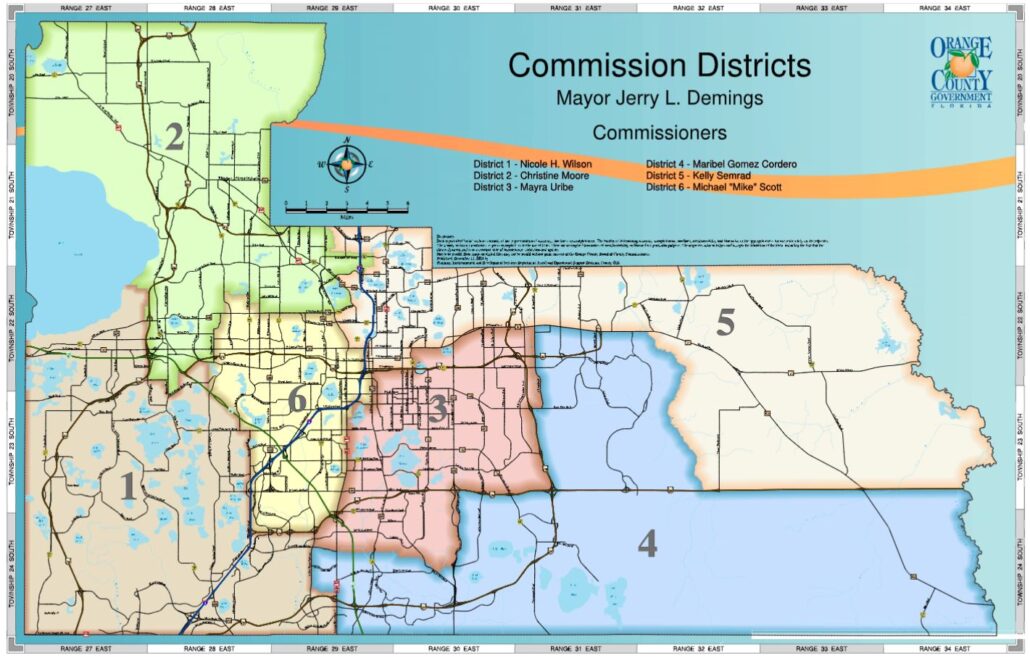
This map shows the way the five county districts stand today with Winter Park in western-most section of District 5. The above maps show the proposed changes.
Three commissioners said they supported Map-1A while two others endorsed Map-7B. Orange County Mayor Jerry Demings said he supported whatever the majority wanted.
That left Semrad — a potentially key vote and the commissioner whose district is caught up in most of the debate.
At a redistricting advisory committee meeting earlier this summer, Semrad said she initially supported a map similar to 7B to leave Winter Park in her district with the rural east and balance out the unincorporated areas with the municipalities. But Tuesday, Semrad backtracked and said she wasn’t ready to make a decision yet as she got a flurry of last-minute public feedback.
On the day of the county workshop, Semrad said she received 100 emails and hadn’t had time to review them all yet.
“I have the people in the east who really want to stay with Winter Park because they look at it as more suburban and that they have nothing in common with downtown and then I have people from Winter Park not seeing compatibility with the rural area,” Semrad said.
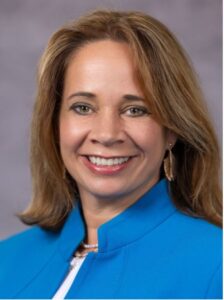
Kelly Semrad
“Does that sound like you can go with either map?” Demings asked her.
“That is the case,” Semrad said.
A delegation from Winter Park has attended the committee meetings and also spoke at Tuesday’s workshop.
Stating her case again, Winter Park Mayor Sheila DeCiccio argued her city should be districted with its Eatonville and Maitland neighbors.
They often work together, she said, pointing to Winter Park and Maitland sharing an elementary school boundary or Winter Park handling Maitland’s emergency calls. Winter Park is also working with Eatonville on a grant for new sidewalks and crosswalks.
“We have no contiguous borders with east Orange County. The gerrymandering and Map-7B to include Winter Park would make Texas proud,” she said. “There is absolutely no compatibility, collaboration, contingent border, or community between us.”
From the public, the county heard a mix of the public’s concerns as some wanted to keep the small cities together in Map-1A while others said Map 7-B made more sense.
Some people feared Pine Hills might get overpowered by Winter Park, so they preferred Map 7-B to keep Winter Park separate from the rest of the urban areas.
One Winter Park resident supported Map-7B for “a pretty selfish reason.”
“I love my county commissioner. I love Kelly Semrad,” the resident said. “During the last election cycle, we had so many people knock doors in Winter Park to understand who Kelly is and why she was a candidate for county commissioner.”
And Ella Wood, a Winter Park resident who is the political director for Unite Here Local 737 representing hospitality workers, argued Map-7B was closest to preserving the historic county boundary lines.
“It helps to maintain people’s connection, people’s engagement, and maintaining their community interests,” Wood said.
Meanwhile, Winter Park already has a city government to advocate for itself. “That’s not what we need the county commissioner to do,” Wood said.
Even though the city of Winter Park runs its own police department and handles its own infrastructure needs, city leaders still believe it’s important to get a voice on the county commission.
DeCiccio pointed to potential rail expansion, a new state law taking away local control for growth which some communities are fighting against as well as a contract with Visit Orlando — an agency that DeCiccio is not a fan of — as some of the countywide issues that Winter Park wants to advocate on at the county level. In addition, DeCiccio also brought up the Community Redevelopment Agency, or CRA, which the county allowed Winter Park to expand last year to control more tax dollars that would otherwise go to the county for projects like post-Hurricane Ian flood prevention.
“There will finally be an opportunity for someone from Winter Park, Maitland, Eatonville, College Park, or Pine Hills if Map-1A is adopted … to have a seat at the table,” she said, joined by Commissioner Craig Russell and City Manager Randy Knight to appeal to county commissioners Tuesday.
County staff and commissioners answered back at people’s concerns.
“I hear folks saying… ‘we don’t have anything in common with this group or that group of people,’” said District 6 Commissioner Mike Scott, who reminded residents they are all part of Orange County.
And would Winter Park, with its considerable wealth and tax base, dominate whatever district it ultimately lands in?
Demings looked around his board — commissioners of different races and some who had upset victories to defeat better-funded opponents or represented wealthier areas of the county.
Semrad, for example, was a political newcomer who won the seat last year against former Winter Park Mayor Steve Leary who raised significantly more money than her.
“If you’re the right candidate at the right time,” Demings said. “You can get elected.”
WinterParkVoiceEditor@gmail.com
To comment or read comments from others, click here →


 The club’s general manager did not immediately return a call for comment on the new conditions.
The club’s general manager did not immediately return a call for comment on the new conditions.














Recent Comments